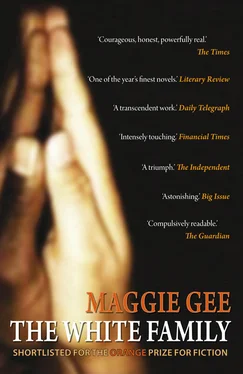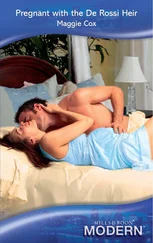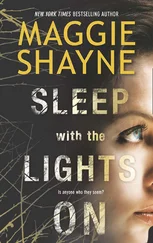Maggie Gee
The White Family
To Vic and Aileen
and for Hanna
Thank you to those who made this book possible: above all to Moris and Nina Farhi; to Mai Ghoussoub, the publisher who changed the course of my life by believing in it, and to André Gaspard; to my beloved friends Barbara Goodwin and Hanna Sakyi, who helped me in completely different ways, and to Nick Rankin.
Thank you to those who made it better: my editor Christine Casley, Mike Phillips, Colin Grant, Robert Taylor, Wesley Kerr, Michael Miller, Prabirranjan Ray, Norman Mitchell, Rita Patel, Roy Kerridge for lyrics from his beautiful book The Storm is Passing Over: A Look at Black Churches in Britain , J R Shah, David Godwin and Sarah al-Hamad.
Thank you also to John Coldstream, Mark LeFanu, Peter Kemp, Jonathan Lloyd and Caroline Winterburn for their kindness. Thank you to Jonathan Warner who commissioned this book in another life, and is still missed and remembered. Lastly, thank you to Rosa for making me laugh; and to our local park keeper, whose devotion to duty and love of the park were an inspiration, though his character and personal life bear no resemblance to those of my own fictional park keeper.
Albion Park on a fierce spring morning. A mad March day of ice and fire. Thomas’s feet beat a tattoo on the path. Every hair, every bristle on his chin stands on end. He is a small star-ship of blazing neurons –
He is a librarian, on his way to work, half-blind with sun and cold and memory. He used to come here with Darren after school (were they six, or seven, when they first escaped their mums?) And Darren’s dad, Alfred, was the Park Keeper –
Was, and still is. Still at his post. Something epic about it; nearly fifty years of service … Alfred White, who holds the fort.
Thomas hears raised voices, a little way away.
And glimpses Alfred beyond a row of plane trees, a small brisk figure in a military greatcoat. His familiar flat cap with its thin fringe of white hair, in the middle distance by the prize flowerbeds. It’s the only bit of grass where people aren’t allowed to walk; one of Alfred’s main jobs is shooing them off it.
Thomas sees that the woman he is talking to is black. There are two young children; she holds one by the arm.
‘It’s my job, lady. I’m doing my job —’ The voice of authority, from Thomas’s childhood.
‘’Ang on a minute. I’m tryin’ to tell you —’
‘Can you move off the grass, madam. I’m asking you nicely —’
‘People like you don’t never listen!’
‘You don’t have to shout, miss.’
‘Look, I weren’t shoutin’ —’
‘Next thing is, you’ll be all over the tulips.’
Now the little girl begins to cry, a high-pitched sound that seems to come from a childish realm of pain and loss quite unconnected to the grown-ups’ quarrel. She tries to yank her arm away. ‘Mum, Mum, Mum, I can see it!’
‘Shut it, Carly, I’m talkin’ to the man!’
‘Mum, Mum, I want to —’
‘SHUT IT!’
From the woman’s other side, Alfred presses his advantage. ‘If everyone walked here, there’d be no grass left —’
Harried by both of them, she suddenly cracks. ‘Fuck off! I’m tellin’ you, you’re OUT OF ORDER!’
A tall black man comes hurrying across, carrying a purple basket-ball, and stands close to Alfred, looming over him. He looks at least a foot taller than Alfred, and two feet wider across the shoulders. (Was he actually threatening? Thomas wondered later. Could you say he was threatening? No, just tall. And black, of course, that was part of it.)
‘What’s the problem?’ the man asks, fairly politely.
‘No ball-games here, sir, I’m afraid.’
‘We’re not playin’ no ball-game. Why’s Carly cryin’?’ he demands of his wife, who has subsided a little.
‘He upset her, didn’t he.’ She indicates Alfred. ‘She went and lost Dwayne’s new plane, innit. So she gets it in her head that it’s in the flower-bed.’
‘So what’s up with you man?’ the father asks, frowning down on Alfred. ‘What’s your problem?’
The girl wails louder. Dwayne pokes her in the ear.
Alfred looks pale and old beside them. ‘No mention was made of any lost plane,’ he says, uncertainly, peering round him.
‘This Park belongs to everyone,’ the black man informs him.
‘That’s just it!’ Now Alfred perks up. ‘Same rules for everyone, as well. I’m just asking you lot to get off the grass.’ He wags his finger vigorously.
The woman’s face changes. Is it rage, or glee? ‘“You lot”!’ she shrieks. ‘That’s racist, innit!’
A pause. The two men avoid each other’s eyes. The word lies between them like an unexploded bomb. ‘I’ve been doing this job for fifty years,’ Alfred begins, but the rest is lost.
‘JOHNNY!’ she screams. ‘Call the police on this bastard! Use your mobile! I’m tellin’ you!’
But Johnny snickers, and turns away. ‘You’re windin’ me up,’ he says to his wife. ‘Come on … An’ leave it out,’ he snaps at his children. ‘Don’t whine, Carly, do you hear me?’ But he pauses a moment, staring back at Alfred, saying something with his eyes: this is our Park too.
Thomas feels it is time to announce his presence. ‘Hi Alfred,’ he calls, so Alfred knows he is there. For a moment the old man just stares at him, then raises his hand in a lame half-wave. He manages a smile, but his face is very red.
‘The man is ignorant,’ the black woman announces, beckoning her children in a queenly fashion. When the boy doesn’t stir, she yells at him ‘Dwayne! Get over here! Move it!’ Cowed, Dwayne does as he is told.
They sweep away, a good-looking family, smartly dressed, young, glossy. The mother has righteous arms around her kids, who are still resisting, and pointing at the flower-bed.
‘You see how it is?’ Alfred asks, out of breath. There are bubbles of spit at the corner of his lips. ‘Can’t bloody win, whatever I do. And the language … The women are worse than the blokes. They’d turn the Park back into a jungle. There are notices. These people can’t read.’
Now they are gone, he feels safe to say it. Thomas starts to protest, but nothing comes out. It’s just a generation thing, he tells himself. The polite silence hasn’t fallen, for them. ‘Are you all right, Alfred? You don’t look well.’
‘Calling the police on me. Bloody cheek. They’d laugh in their faces, down at the station. I’ve got good mates there. Known me for years.’ Alfred pauses, still breathing hard, and his pale blue eyes focus shrewdly on Thomas. ‘I’m not against them, you know. Don’t get me wrong —’
‘I didn’t think you were,’ Thomas lies, feebly. This is a subject that cannot be spoken. He veers away. ‘Have you heard from Darren?’
‘They go on the grass. Always doing it. English people know not to go on the grass —’
‘Alfred, shouldn’t you sit down for a moment?’ There is something very wrong about Alfred’s pupils.
‘I’m not a man of leisure, like you,’ Alfred says. ‘Things to do. Jobs on my list. Not least the toilets. It never stops.’
‘You’re upset.’ Which is the wrong thing to say.
‘I never let that lot get to me.’
‘I’m not sure they intended —’ Thomas tries.
But Alfred is off, with a bony smile, launching himself against the wind like a fighter. ‘Bye, lad. Take care now.’
‘See you, Alfred.’
Thomas watches him go, lickety-split, a white-haired soldier off at the double. Glancing back for an instant, his eye is held by a cross of scrap paper flickering on the red swathe of tulips ten metres away. As he stares, the cross becomes a child’s toy plane, crazily poised on a crimson runway. He thinks of going to pick it up; rushing after the family, making everything right –
Читать дальше












